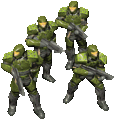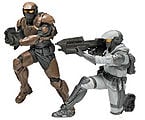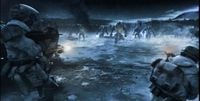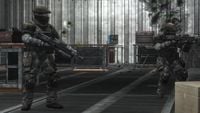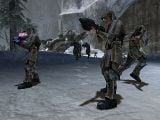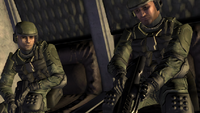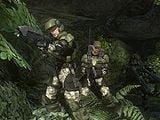UNSC Marine Corps: Difference between revisions
From Halopedia, the Halo wiki
(→Organization: Repeated word-Omitted Word) |
(→Trivia) |
||
| Line 153: | Line 153: | ||
*In the ''[[Halo: Combat Evolved]]'' level ''[[The Truth and Reconciliation]]'', [[Jacob Keyes|Captain Keyes]] tells a Marine to "''Stow your bellyaching soldier -- remember, you're a leatherneck!''" [[Wikipedia:Leatherneck|Leatherneck]] was a nickname earned by [[wikipedia:US Marines|U.S. Marines]] in the era of the [[Continental Marines]]. The Marines would wear leather collars to provide protection from slashing attacks as they boarded enemy ships. Although an appropriate reference to Marines, the term "Leatherneck" and "soldier" are viewed by their respective service members as being incompatible, and a means of differentiating between service in the Marine Corps or Army. | *In the ''[[Halo: Combat Evolved]]'' level ''[[The Truth and Reconciliation]]'', [[Jacob Keyes|Captain Keyes]] tells a Marine to "''Stow your bellyaching soldier -- remember, you're a leatherneck!''" [[Wikipedia:Leatherneck|Leatherneck]] was a nickname earned by [[wikipedia:US Marines|U.S. Marines]] in the era of the [[Continental Marines]]. The Marines would wear leather collars to provide protection from slashing attacks as they boarded enemy ships. Although an appropriate reference to Marines, the term "Leatherneck" and "soldier" are viewed by their respective service members as being incompatible, and a means of differentiating between service in the Marine Corps or Army. | ||
*In [[2007]], Bungie hired an actual Marine, [[Christian Allen]], who served with the US Marines from 1995 to 1999, as a Design Lead. | *In [[2007]], Bungie hired an actual Marine, [[Christian Allen]], who served with the US Marines from 1995 to 1999, as a Design Lead. | ||
*If looked at closley, they share aperances with the spartains such as Kally and Linda. | |||
==Gallery== | ==Gallery== | ||
<gallery> | <gallery> | ||
Revision as of 09:56, January 23, 2012
Template:Infobox Military Unit
- "They're the best of the best, but they're only human."
- — Description[1]
The United Nations Space Command Marine Corps is a branch of the UNSC Defense Force, responsible for land-based military operations, using the mobility provided by the UNSC Navy to rapidly deliver forces. It is also responsible for the protection of UNSC Naval vessels and installations from attack.
A rugged and diverse assortment of well-equipped and well-trained men and women, one of the Marine Corps's most notable conflicts was fighting a losing war against the Covenant's superior technology and numbers.
History
Origins
Marine forces which would eventually become the UNSC Marines were one of the primary combat groups fielded by the United Nations in the conflicts of the 2160's, and were the first military organization deployed offworld in 2163. It was during this time that the UN's military forces were organized into the United Nations Space Command, thereby establishing the UNSC Marine Corps. Later, the UNSC Marine Corps would be responsible for dealing with Insurrectionist uprisings among UNSC colonies and star systems.
Human-Covenant War
- Main article: Human-Covenant War
During the course of the Human-Covenant War, the Marines played a central role in maintaining a defensive stand as well as assaulting several Covenant base of operations. The battles of Harvest, Arcadia, Sigma Octanus IV, and Earth saw fierce fighting between Marines and the Covenant Army.
First Encounter
- Main article: First Battle of Harvest
The UNSC Marine Corps' first encounter with the Covenant was at the First Battle of Harvest in 2525. At the event, only three Marine officers were present, training the planet's Colonial Militia. During the battle, Captain Ponder became the Corps' first casualty of the war.
Outer Colonies
- Main articles: Harvest Campaign, Battle of Arcadia
Not long after the First Battle of Harvest, the Corps' experienced one of their first major encounters with the Covenant at numerous engagements throughout the Outer Colonies, including the Harvest Campaign, eventually lasting from 2526 to 2531. At the final stages of the campaign, the Marines quickly established a base of operations in Harvest's arctic region. A reconnaissance force led by Sergeant John Forge was deployed to survey the area. However, during the patrol, Covenant forces under the command of a Covenant Arbiter overran and nearly destroyed the base. Forge rallied scattered marines, who quickly retook it from the aliens. After receiving reinforcements and repairing the base, the Marines fought through a sizable Covenant garrison force in an attempt to secure a mysterious Forerunner structure in the region.
The First Battle of Arcadia saw the UNSC Marine Corps holding the defensive line around major population centers to allow evacuation for the civilian population with the assistance of the SPARTAN-II Red Team. Successfully keeping Covenant forces from occupying the population centers, the Corps' began launching multiple assaults on the Covenant's base of operations to reclaim the planet.
The UNSC Marine Corps would take part in numerous actions against the Covenant on many of the Outer Colonies in the years that followed. Unfortunately, they were hopelessly outgunned, out-numbered and out-flanked by the Covenant forces and the Marine Corps would suffer tremendous losses in what eventually saw the near-destruction of the Outer Colonies.
Battle of Sigma Octanus IV
- Main article: Battle of Sigma Octanus IV
The Corps' experienced another encounter with the Covenant on the colony world of Sigma Octanus IV. Upon landing, the Marines' hardware and equipments were rendered useless due to the planet's harsh environment. In the first stage of the battle, during a naval engagement, a Covenant Carrier was able to land a large contingent of troops on the northern pole of the planet. The Covenant were able to take Côte d'Azur, a major population center. Fortunately almost all of the civilian population was evacuated beforehand, but the UNSC Marine Corps' General Kits launched a failed assault to retake the city.
Fall of Reach
- Main article: Fall of Reach
The UNSC Marine Corps maintained a sizable presence on Reach when the Covenant stormed the planet; they bypassed the defense fleet in orbit, as well as the MAC Gun platforms, and made a considerable landing of soldiers on the North and South Poles. During the early hours of the battle, the Covenant had overrun FLEETCOM HQ on Reach, destroying the perimeter and swarming the Marine defenders with Banshees, Wraiths, and battalions of infantry. The situation became severe and critical when the Marines were forced to defend the Orbital Defense Generators against a massive Covenant assault, using every available armored vehicle and defensive position from available bunkers. The Battle of Reach became one of the most devastating defeats for the UNSC Marine Corps in the Human-Covenant War.
Battle of Installation 04
- Main article: Battle of Installation 04
The surviving Marines from the Battle of Reach served an important role in the Battle of Installation 04, taking part in such engagements as securing the UNSC Pillar of Autumn crash site, launching multiple guerrilla assaults on Covenant convoys and base of operations and rescuing captured Pillar of Autumn's personnel from a Covenant Battlecruiser. Initially, the Marines were part of a special operation consisting of a sizable Orbital Drop Shock Trooper special forces detachment and a standard Marine detachment to infiltrate Covenant High Command and kidnap a Covenant Prophet.
Battle of Earth
- Main article: Battle of Earth
- "Dear Humanity, we regret being alien bastards. We regret coming to Earth. And we most definitely regret that the Corps just blew up our raggedy-ass fleet!"
- — Sergeant Johnson
The UNSC Marine Corps remained in force on Earth and its geosynchronous Orbital Defense Platforms, and were mostly prepared to repulse a relatively small Covenant invasion, when fifteen Covenant capital warships, two Assault Carriers and thirteen Covenant Cruisers, entered the Sol System. They then played a significant role in the the Covenant ground assault on Earth where they defended multiple major population centers from the Covenant's occupation such as those in New Mombasa, Cleveland, and Havana.
Several Marine detachments achieved a turning point during the course of the Battle of Earth when they managed to retake the cities and maintain temporary ground control for UNSC reinforcements to arrive. Such Marine detachments were the 405th, which was able to engage the Covenant ground forces in Mombasa, Kenya as the Covenant Assault Carrier landed Phantoms, Orbital Insertion Pods, and used its Gravity Lift to directly deploy reinforcements.
The Marine Corps also partook in a major assault alongside the UNSC Navy in Voi. As ground forces, the Marines were to engage in the Battle of Voi with a SPARTAN-II supersoldier by eliminating anti-air vehicles and batteries, as well as destroying temporary Covenant outposts to allow UNSC reinforcements to refortify the area.
Battle of Installation 00
- Main article: Battle of Installation 00
The Marines fought in the war's last battle at the Ark. Starting with their deployment in an operation codenamed Operation: BLIND FAITH,[2] the Marines launched numerous attacks on Brute strongholds, including an attack on the Ark's cartographer. After fighting on foot, and in heavy vehicles, the Marines drove off the Covenant. They then teamed up with the Elites and attacked three Barrier Towers protecting the Ark's Citadel. After capturing the first tower, with the help of the Master Chief, Marines and UNSC Pilots then defeated the Covenant Air Force. They then waited for the deactivation of the third tower, where they then staged an attack on the Citadel. After fighting two Scarabs, they were then evacuated back to the fleet while the Master Chief and the Arbiter killed Truth. The surviving Marine forces fell back to Earth through the Portal onboard the Shadow of Intent before Installation 04B was activated.
Organization
The Marine Corps is subordinate to the UNSC High Command (HIGHCOM). Like the UNSC Army, the UNSC Marine Corps is organized under the Unified Ground Command.[3] However, because of its role in expeditionary warfare and its deployment from space, there are a number of differences in its organization from the Army. As well as possessing infantry, armored, and air units, the UNSC Marine Corps is based around Marine Expeditionary Forces, which contain at least one division-sized unit of Marines, an Air Wing, and a Logistics Group.[4]. Because of its role as an "amphibious", space-deployed force, the Marine Corps enjoys a close relationship with the UNSC Navy, with Marine complements being deployed on most warships.[5][6][7]
In addition to conventional forces, the Marine Corps maintain special operations forces in the form of the Orbital Drop Shock Troopers. ODSTs drop into hostile areas via SOEIVs prior to the main invasion. They attempt to complete some of the most difficult tasks in hostile areas, such as clearing enemy ground forces or establishing landing zones for incoming Pelicans.[8][9]
Personnel
Large numbers of men and women are employed by the UNSC Marine Corps. Servicepeople hold ranks, which are divided between officers and enlisted. The rank structure of the UNSC Marine Corps is based around that of the United States Marine Corps. Template:UNSC Enlisted Ranks Template:UNSC Officer Ranks
Uniform
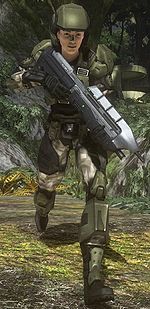
- Main articles: UNSC Marine Corps Dress Uniform, UNSC Marine Corps Battle Dress Uniform, ODST battle armor
Marine Corps Dress Uniforms are worn on formal or ceremonial occasions, and are similar to those worn by their 20th and 21st Century predecessors in the United States Marine Corps. A variety of dress uniforms exist, including a white-and-blue uniform,[10] an all-blue uniform,[11] and an all-black funerary uniform.[12]
In the field, Marines usually wear passively camouflaged uniforms with body armour. Marine helmets are mounted with holographic text-displaying eyepieces and recorders. As well as helmets, Marines on field operations in more humid locales sometimes choose to wear boonie covers, or those in colder environments don visored and thicker helmets. Marine NCOs are easily recognized by the cover they wear complete with the UNSCDF insignia, although they oftentimes substitute this soft cover for a more practical protective helmet. Marines sometimes don small helmet communications microphones or black-phased sunglasses on their helmets, and others carry backpacks. Marines have been seen to wear black gloves, probably to protect their hands and improve their grip on their weapons. Some marines sport orange visors which attach to the brim of their helmets.
Marines operating in cold environments wear environmentally-tailored armor, with insulated snow camouflage utilities and full body armor as well as insulated and visored helmets with something analogous to a balaclava.[13]
Orbital Drop Shock Troopers sport heavy and articulated black battle armor, which also double as an armored g-suit that allows for safe transport in small ships during turbulent atmospheric entry. They also wear fully-visored, black helmets that cover the entirety of the head, and can withstand several headshots. This armor, overall, provides ODSTs with more protection than standard marine armor.
Equipment
Infantry weapons
The standard issue weapon for UNSC Marines Corps is Misriah Armory's MA5 assault rifle series, which can be outfitted with an M301 Grenade Launcher or an underslung shotgun. Most Marines were issued the MA5B variant until its nearly universal replacement in late 2552 by the MA5C variant. The BR55 Battle Rifle and its heavy barrelled variant are used both as standard service rifles and as marksman's weapons. The Corps issues several models of the M6 handgun series, with its standard sidearm being the M6G Personal Defense Weapon System. Suppressive fire is provided by the M247 General Purpose Machine Gun, the AIE-486H Heavy Machine Gun, and mounted versions of the M41 Light Anti-Aircraft Gun. Special forces and vehicle crews are issued M7 Caseless Submachine Guns, with special forces typically using the suppressed model. The M90 Close Assault Weapon System is often utilized in close-quarters engagements.
Snipers operate the SRS 99C-S2 AM and SRS 99D-S2 AM sniper rifle variants for anti-matériel and anti-personnel operations. The M99 Special Application Scoped Rifle is used as a dedicated anti-matériel weapon. Standard UNSC sniper teams consists of two operators; a spotter and a sniper.
Anti-armor fire is provided by the M19 and M41 missile and rocket launchers and the Model 6 Grindell/Galilean Nonlinear Rifle directed-energy-weapon. Portable anti-air fire is provided by the M19-B Surface-to-Air Missile Launcher. The Marine Corps also utilizes the XM510 Multishot Grenade Launcher. The NA4 and M7057 flamethrowers are sometimes used in an anti-infantry role. The M9 High-Explosive Dual-Purpose Grenade is the standard-issue hand grenade of the UNSC Marine Corps. Several specialized grenades, as well as numerous types of landmines and explosive charges, are also used by Marine infantry.
Ground vehicles
The UNSC Marines Corps' standard vehicle is the M12 Force Application Vehicle, which is used for armored patrols and personnel mobility. The M12 FAV is produced in several variants. The most common of these variants is the M12 Light Reconnaissance Vehicle, which is armed with an M41 Light Anti-Aircraft Gun. Light anti-vehicle support is provided by the M12G1 Light Anti-Armor Vehicle, which is armed with an M68 Gauss Cannon, the M12A1 Light Anti-Armor Vehicle, which is mounted with a 102mm SC-HE Rocket Turret, and the M12R Light Anti-Armor Vehicle, which features an M79 Multiple Launch Rocket System. The M831 Troop Transport serves as a fast, lightly armored transport vehicle for squads. The M274 Ultra-Light All-Terrain Vehicle is commonly used for scouting and light target interdiction.
For heavy engagements, the Marine Corps operates the M808B Main Battle Tank, which is armed with an M512 Smooth Bore High Velocity Cannon and an M247T Medium Machine Gun. The M9 Main Anti-Air Tank is the Corps' primary mobile anti-air asset. The SP42 Cobra provides heavy anti-vehicle and anti-structure support. The M312 Heavy Recovery Vehicle provides heavy matériel recovery and troop transport.
Less standard vehicles also saw service with the Marine Corps during the Human-Covenant War. The M-145D Rhino was outfitted with a reverse-engineered plasma mortar. The Gremlin Combat Support Vehicle is used to disable enemy vehicles with its onboard EMP weapon. The Cyclops support exoskeleton was used both repair duties and logistical support, as well as in combat, though it was eventually retired from service.
Aircraft
The Marine Corps' most common aircraft is the Pelican dropship, including the D77-TC and D77H-TCI variants. The Pelican is used as a multirole aerodyne which is capable of carrying numerous armament configurations, including Scorpion anti-tank missiles, Anvil II air-to-surface missiles, as well as a chin-mounted 7.62mm machine gun, or a 40mm or 70mm autocannon. The Pelican can also be outfitted with an M247 or AIE-486H machine gun in its troop bay.
The UNSC Marine Corps operates the GA-TL1 Longsword as its primary fighter/interceptor and as a tactical bomber. The Corps also operates the Shortsword-class Bomber, which serves as a close air support aircraft. The Marines utilize the AV-14 Hornet as a light attack craft and gunship. Earlier in the war, the Marines also utilized the AV-22 Sparrowhawk as a close air support gunship, though it was largely retired from service due to problems with its propulsion system. The SkyHawk VTOL strike fighter is presumably used in a similar manner to the Longsword and Shortsword. Heavy air-to-ground support is provided by the AC-220 Vulture gunship. Marine air units are usually intended to support ground forces or to drop off vital equipment for the Marines, either in close-air-support or air interdiction roles, with the UNSC Navy and the UNSC Air Force taking on the dedicated air force role.[14]
Trivia
Template:Quotes Link Template:Gameplay link
- The equipment and armor used by UNSC Marines resembles the modern-day US Army's Future Force Warrior Program, and conceptually may have been inspired by it.
- Bungie went to great lengths to ensure that the Marines reflected the diversity of Earth; some Marines look and sound American, while others appear Asian, African, Australian, Hispanic and European. Many were also modeled on members of Bungie's own staff members to provide further diversity in the universe.
- In the Halo: Combat Evolved level The Truth and Reconciliation, Captain Keyes tells a Marine to "Stow your bellyaching soldier -- remember, you're a leatherneck!" Leatherneck was a nickname earned by U.S. Marines in the era of the Continental Marines. The Marines would wear leather collars to provide protection from slashing attacks as they boarded enemy ships. Although an appropriate reference to Marines, the term "Leatherneck" and "soldier" are viewed by their respective service members as being incompatible, and a means of differentiating between service in the Marine Corps or Army.
- In 2007, Bungie hired an actual Marine, Christian Allen, who served with the US Marines from 1995 to 1999, as a Design Lead.
- If looked at closley, they share aperances with the spartains such as Kally and Linda.
Gallery
- H2 - Marine01.png
Early concept art of the Marines for Halo 2.
- H2 - Marine02.png
Early concept art of the Marines for Halo 2.
- H3 - Marines Concept.png
Concept art of the Marines for Halo 3.
Both the Arctic and Desert variations of the Marine Battle Dress Uniform seen in Halo Wars.
UNSC Marines in battle with the Covenant on Harvest during the Harvest Campaign.
- Unscmarines jumped.jpg
UNSC Marines in Halo: Reach.
UNSC Marines on Reach.
Marines on Installation 04.
Marines during the early stages of the Battle of Earth.
- Johnson&marines.jpg
UNSC Marines in the Pillar of Autumn in Halo: Combat Evolved Anniversary.
M52B Armor being worn by an Xbox LIVE Avatar; available for purchase in the Avatar Marketplace along with miscellaneous Halo-related items.
- 1771877-gallery.png
Concept art of a marine in Halo Legends: Homecoming.
- UNSC Marines in Uplift Reserve.jpg
UNSC Marines fighting in Uplift Reserve in New Mombassa.
Sources
- ^ Halo: Combat Evolved Manual
- ^ Halo Encyclopedia, page 57
- ^ Halo Encyclopedia
- ^ Halo: Contact Harvest, page 111
- ^ Halo: Combat Evolved
- ^ Halo 2
- ^ Halo: The Fall of Reach
- ^ Halo 2
- ^ Bungie.net, ODST Field Guide
- ^ Halo 2, campaign level, Cairo Station
- ^ Halo: Contact Harvest
- ^ The Life
- ^ Halo Wars
- ^ Letter - Re:Antilon Mine
Related Pages
- Orbital Drop Shock Troopers
- List of UNSC Marine Corps Personnel
- List of UNSC Marine Corps Units
- UNSC Marine Corps in the Games

